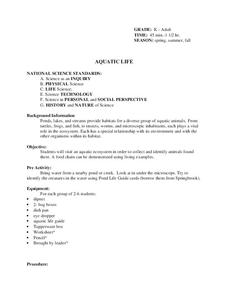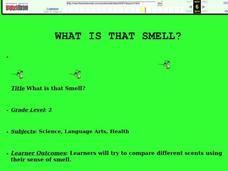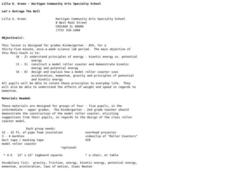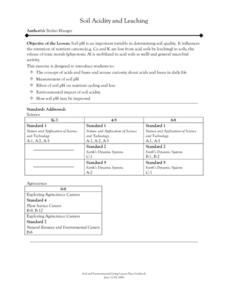Washington Office of Superintendent of Public Instruction
Using Our Senses to Observe
Look around and explore. Little ones use their five senses with some day-to-day activities designed to guide observation and apply STEM strategies. Young scientists learn through comparing/contrasting and observing with magnifiers as...
Curated OER
Oceans in Motion
This simple lesson introduces children to basic marine life as well as to show them the necessity of protecting aquatic environments. Some famous marine life animals are introduced via vocabulary words, then children cut out pictures of...
Curated OER
Starfish Project: Ceramics
After exploring the wonders of ocean life found in tidal pools, explore ocean life through ceramic art. Kids use texturing and the pinch-and-pull technique to create starfish, just like the ones found at the seashore. Suggested...
PBS
The Butterfly or Adult
Now that your class knows about the life cycle of a butterfly, it's time to discuss how an adult butterfly survives in the wild. The class diagrams and labels the parts of a butterfly, discusses how butterflies survive, and then make a...
Curated OER
Ocean Life Mural
Students conduct Internet research on ocean life, view pictures of sea life, and create a class ocean life mural.
Curated OER
Eating Plants
Students identify parts of a plant. In this life science lesson, student groups locate the leaves and fruits on vegetables, then find the roots. Lesson includes extension activities and background teacher information.
Curated OER
Aquatic Life
Pupils explore aquatic life. In this science lesson, students visit an aquatic ecosystem and collect animals found there. Pupils create a food chain for the aquatic ecosystem.
Curated OER
How Does Your Garden Grow?
Students construct and maintain a school garden. In this gardening lesson, students plan the construction of the garden by writing letters to local businesses asking for supplies and materials; students build the garden using their math...
Curated OER
What is That Smell?
Students identify various scents by using their sense of smell. In this five senses lesson, students smell items such as popcorn, mint, and lemon and identify the scents by only using their sense of smell.
Curated OER
Dolphins
Students explore sea life. For this cross curriculum fine arts, science, and P.E. "dolphins" lesson, students sing songs and play games about dolphins, perform water experiments, create mosaics, and use their five senses to explore sand...
Curated OER
Five Senses: Brave Little Monster
Students identify which of the five senses is being used at a given time. They read "Brave Little Monster" by Ken Baker and then read the story again as they match student-made cards depicting the five senses to moments in the story.
Curated OER
Local River Life
Learners identify rivers in their county, state, or province, and
research various kinds of animals and plants living in or near the rivers.
They write short summaries about the animals and plant life, draw pictures, and compile...
Curated OER
Observing and Drawing Structures of Guppies and Goldfish
Students observe fish and focus on their structures. In this life science lesson, students work in a group and observe guppies and gold fish.
Curated OER
Paper Plate Sunflowers
A great way to recall the parts of a flower is to make one. Little learners create sunflowers out of paint and paper plates. They also discuss and label the various parts of their flowers.
Alabama Learning Exchange
Peeking At Pumpkins
Students listen to a read aloud about the life cycle of the pumpkin and discuss the process. They complete a life cycle booklet.
Curated OER
Red Wigglers
Students are introduced to the benefits of using Red Wiggler worms to produce compost. They identify the requirements for the worms and the methods to follow in order to produce compost. They draw a picture of a functioning worm bin.
Curated OER
Let's Outrage the Bull
Students study kinetic and potential energy. In this energy lesson, students in grades K-2 understand the differences between kinetic and potential energy. Students in grades 3-5 demonstrate that kinetic and potential energy. Students in...
Curated OER
Soil Acidity and Leaching
Students are introduced to the concept of acids and bases and arouse curiosity about acids and bases in daily life. They are introduced to the measurement of soil pH. Pupils are introduced to the effect of soil pH on nutrient cycling...
Curated OER
An Emerald Place
Students discover four layers of the rain forest and identify the life of animals at each level.
Virginia Department of Education
Weather Patterns and Seasonal Changes
Get your class outside to observe their surroundings with a lesson highlighting weather patterns and seasonal changes. First, learners take a weather walk to survey how the weather affects animals, people, plants, and trees during...
Curated OER
Let's Start Growing
Students investigate how a tree grows from a seed. For this plant biology lesson, students use potting soil, tree seeds, and a paper cup to observe seeds growing into plants. Students record observations in their science journals.
Curated OER
Plant Parts
Students use "Kid Pix" to explore plants. In this science and technology lesson plan, students become familiar with plant parts and label them on a plant. Students tell the functions of each of the plant parts.
Curated OER
All The Seasons
Students explore winter, spring, summer, and fall. In this science and technology lesson plan, students use "Kid Pix" to draw pictures that represent the four seasons.
Curated OER
More Lizard Snacks
Students listen to Chapter I, Chapter II, Chapter III, and Chapter IV of "The Forgetful Pony". They observe different stages of development of mealworms. The student sequences pictures to show the life cycle and draws the developmental...

























